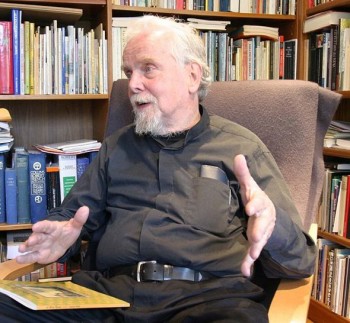Search results for "Rosa Liksom"
Finlandia Prize candidates 2011
17 November 2011 | In the news
 The candidates for the Finlandia Prize for Fiction 2011 are Eeva-Kaarina Aronen, Kristina Carlson, Laura Gustafsson, Laila Hirvisaari, Rosa Liksom and Jenni Linturi.
The candidates for the Finlandia Prize for Fiction 2011 are Eeva-Kaarina Aronen, Kristina Carlson, Laura Gustafsson, Laila Hirvisaari, Rosa Liksom and Jenni Linturi.
Their novels, respectively, are Kallorumpu (‘Skull drum’, Teos), William N. Päiväkirja (‘William N. Diary’, Otava), Huorasatu (‘Whore tale’, Into), Minä, Katariina (‘I, Catherine’, Otava), Hytti no 6 (‘Compartment number 6’, WSOY) and Isänmaan tähden (‘For fatherland’s sake’, Teos).
Kallorumpu takes place in 1935 in Marshal Mannerheim’s house in Helsinki and in the present time. Laila Hirvisaari is a popular writer of mostly historical fiction: Minä, Katariina, a portrait of Russia’s Catherine the Great, is her 39th novel. Gustafsson’s and Linturi’s novels are first works; the former is a bold farce based on women’s mythology, the latter is about guilt born of the Second World War.
The jury – journalist and critic Hannu Marttila, journalist Tuula Ketonen and translator Kristiina Rikman – made their choice out of 130 novels. The winner, chosen by the theatre manager of the KOM Theatre Pekka Milonoff, will be announced on the first of December. The prize is worth 30,000 euros. It has been awarded since 1984, to novels only from 1993.
The fact that this time all the candidates are women has naturally been the object of criticism: why are the popular male writers’ books of 2011 missing from the list?
Another thing that these novels share is history: five of them are totally or partially set in the past – Finland in 1935, Paris in the 1890s, Russia/Soviet Union in the 18th century and in the 1980s, and 1940s Finland during the Second World War. Even the sixth, Huorasatu, bases its depiction of the present day in women’s prehistory, patriarchy and the ancient myths.
The jury’s chair, Hannu Marttila, commented: ‘This book year is sure to be remembered for a generational and gender change among those who write literature about the Second World War in Finland. Young woman writers describe the war with probably greater diversity than before. From the non-fiction writing of recent years it is clear that the struggles and difficulties of the home front are increasingly being recognised as part of the general struggle for survival, and on the other hand the less heroic aspects of war, the shameful and criminal elements, have also become acceptable as objects of study.’
Marttila concluded his speech: ‘When picking mushrooms in the forest, I have learned that it is often worth humbly peeking under the grass, and that the most glaring cap is not necessarily the best…. Perhaps it is time to forget the old saying that there is literature, and then there is women’s literature.’
Happy birthday to us!
13 February 2014 | Letter from the Editors

Picture: Wikipedia
It’s been five years since Books from Finland went online, and we’re celebrating with a little bit of good news.
In the past year, the number of visits to the Books from Finland website has grown by 11 per cent. The number of US and UK readers grew by 29 per cent, while the number of readers in Germany – stimulated perhaps by the publicity Finnish literature is attracting as a result of its Guest Country status at this year’s Frankfurt Book Fair – increased by an astonishing 59 per cent.
We’re chuffed, to put it mildly – and very thankful to you, dear readers, old and new. More…
Encounters with a language
12 December 2014 | Articles, Non-fiction
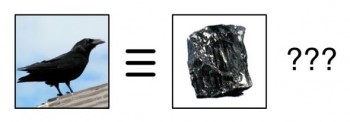
Mistranslation: illustration by Sminthopsis84/Wikimedia
Mother tongue: not Finnish. How do people become interested enough in the Finnish language in order to become translators? In the olden days some might have been greatly inspired by the music Sibelius (as were the eminent British translators of Finnish, David Barrett or Herbert Lomas, for example, back in the 1950s and 1960s). We asked contemporary translators to reminisce on how they in turn have become infatuated enough with Finnish to start studying and translating this small, somewhat eccentric northern language. Three translators into English, one into French, German and Latvian tell us why
What Finland read in March
13 April 2012 | In the news
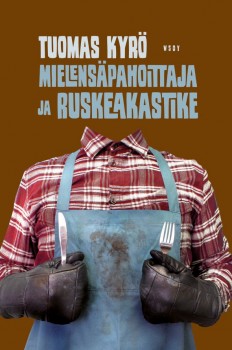
Tuomas Kyrö: ‘Taking offense’, part two
The top of the March list of best-selling fiction titles in Finland, compiled by the Finnish Booksellers’ Association, was Katja Kettu’s love story set in 1940s Finland at war, Kätilö (‘The midwife’, WSOY; see our feature).
Tuomas Kyrö (born 1974) featured twice on the list: Mielensäpahoittaja (‘Taking offense’, WSOY, 2010) was number two and the newly-published sequel, Mielensäpahoittaja ja ruskeakastike (‘Taking offense: the brown sauce’, 2012) had shot up to sixth place.
The title is actually a noun: ‘He who takes offence’: this person is an 80-something man who lives in the countryside and opposes most of what a contemporary lifestyle has to offer.
In the sequel, as his wife has to stay in a nursing home, ‘He who takes offence’ decides to learn how to cook for himself. He dismisses the ‘no-good’ girl who bring him food dailysent by a local agency. A firm believer in the potato, this no-nonsense character continues to fascinate lots of readers.
Rosa Liksom’s Finlandia Prize -winning novel set in the Soviet Union in the 1980s, Hytti nro 6 (‘Compartment number 6’, WSOY) occupied fourth place, a new novel about family life by Eve Hietamies, Tarhapäivä (‘Kindergarten day’, Otava) was number three.
The non-fiction list was topped by a new cookbook by Sikke Sumari, Sikke – ruokaa rakkaudella Toskanassa (‘Sikke – food with love in Tuscany’, Paasilinna). As books about birds featured on the list, one might assume spring is on the way, at last.
What Finland read in November
16 December 2011 | In the news
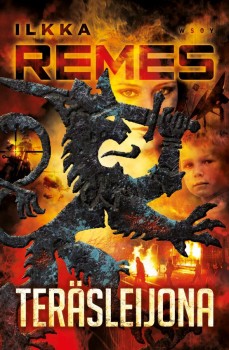 The latest thriller, Teräsleijona (‘Steel lion’, WSOY), by Ilkka Remes (his 15th) was at the top of the November list of best-selling fiction titles in Finland, compiled by the Finnish Booksellers’ Association.
The latest thriller, Teräsleijona (‘Steel lion’, WSOY), by Ilkka Remes (his 15th) was at the top of the November list of best-selling fiction titles in Finland, compiled by the Finnish Booksellers’ Association.
The second place was occupied by Jari Tervo’s Layla, the third by Minä Katariina (‘I, Catherine’, Otava), a Finlandia Prize -listed historical novel by Laila Hirvisaari. Tuomas Kyrö occupied both the fourth and the tenth place with his novels Kerjäläinen ja jänis (‘The beggar and the hare’, Siltala – a pastiche-style story inspired by Jäniksen vuosi / The Year of the Hare by Arto Paasilinna) and Mielensäpahoittaja (‘Taking offence’, WSOY). Strangely, we think, the Finlandia-winning novel by Rosa Liksom, Hytti no 6 (‘Compartment no 6’, WSOY), was not yet on the list – the day of the awarding was 1 December.
The best-selling list of translated fiction didn’t contain any surprises – Liza Marklund, Jens Lapidus, Paulo Coelho, Henning Mankell, Stephen King – except perhaps for the tenth book, a selection of stories entitled Hyvää joulua, Jeeves! (‘Happy Christmas, Jeeves!’, Teos), by good old P.G. Wodehouse: some of the stories have not been translated into Finnish earlier, hence the delight of local Wodehouse fans.
Among the best-selling books for children and young people were just two foreign names (Thorbjörn Egner, Lisa Jane Smith) and the three at the top were works by very well-known authors: Aino Havukainen & Sami Toivonen, Sinikka Nopola & Tiina Nopola and Mauri Kunnas. (The list is available, in Finnish, here.)
The life and deeds of the late Steve Jobs interested a lot of readers, in Finland as elsewhere, and Walter Isaacson’s translated biography topped the non-fiction list.
Northern prizes
31 October 2013 | In the news
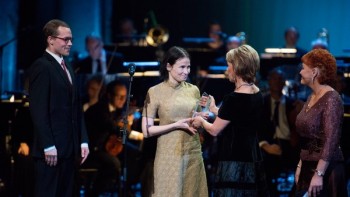
The winners: Seita Vuorela and Jani Ikonen are presented with their prize. Photo: Magnus Froderberg/Nordic Council
The Nordic Council’s five culture prizes were for the first time awarded together at a Gala at the Oslo Opera House on 30 October. The show was broadcast by all the Nordic public service channels.
The winners of the Nordic Council Children and Young People’s Literature Prize 2013 – worth about €43,000 – are Seita Vuorela and Jani Ikonen from Finland. Karikko (‘The reef’, see our review) written by Vuorela and illustrated by Ikonen is the first work to be awarded the newly established Nordic Council Children and Young People’s Literature Prize.
Another Finnish winner this time was the violinist Pekka Kuusisto (born 1976) who won the Nordic Council Music Prize (also worth €43,000). ‘Pekka Kuusisto is a violinist in the absolute elite and with as much unique creativity as musicality,’ said the Adjudication Committee.
The 2013 Nordic Council Literature Prize went to a Danish-Norwegian author Kim Leine. The Finnish nominees were Rosa Liksom and Ulla-Lena Lundberg.
The oldest of the five prizes is the Literature Prize, first awarded in 1962. It was followed by the Music Prize (1965), the Nature and Environment Prize (1995), the Film Prize (2002) and the Children and Young People’s Literature Prize (2013).
A smell of the sea
30 March 2000 | Archives online, Fiction, poetry
Poems from Namnet på tavlan Klee målade (The name of the picture Klee painted’, Schildts,1999; Kleen taulun nimi, Otava, 1999; Finnish translation by Jaakko Anhava). Introduction by Hannu Väisänen
Old harmony
You see an old street and stop outside a gate to a shadowy inner courtyard. An oak tree grows there, its crown stretches towards the light. How big it is! On a bench underneath it an old couple sit looking at you. They are trying to discover what you once were. Beside them lies an old lute, like a large, gleaming fruit. You go over to it, pick it up, play a chord. The old woman and the old man look at you without surprise. It has all happened once before, after all. Not much more is needed, only a deep silence. The oak tree murmurs, the old couple have gone, you sit there with your wife and see someone entering the courtyard. Do we know him, you say. But scarcely have you finished your question than the courtyard is empty again, a moment in eternity. More…
Goodbye darling
30 March 2005 | Fiction, poetry
Poems from Niin kovaa se tuuli löi (‘So bitterly the wind struck’, Tammi, 2004)
Lord, you've promised to come, don't hang back.
Here we are already, sitting, me and the dogs,
and the others that have to go.
Jesus, poor thing, didn't know whom to bloom for,
just kept on lugging his cross, pretty as a pony.
He came and shot us down,
bullets flying without his even noticing.
The night was gifted with roses
full of love.
Through a woman we came here, through a man
we leave.
Do you speak my language?
23 August 2012 | Articles, Non-fiction
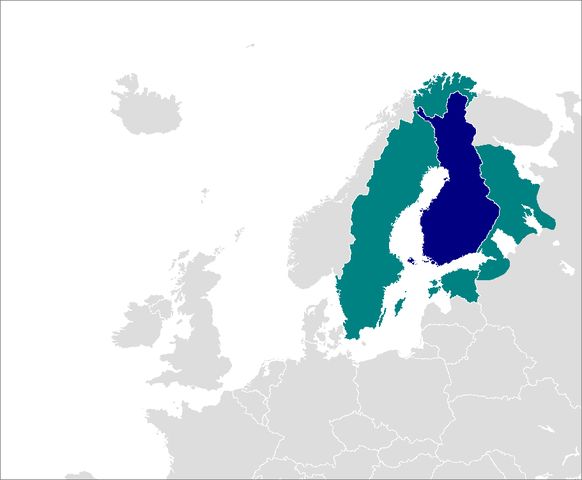
Finnish spoken outside Finland: Sweden (west), Estonia (south), Karelia/Russia (east), Norway (north). Illustration: Zakuragi/Wikipedia
Finland has two official languages, Finnish and Swedish. Approximately five per cent of the population (290,000 Finns) speak Swedish as their native language. All Finns learn both languages at school, and students in higher education must prove they have an adequate knowledge of the other mother tongue. But how do native speakers of Finnish cope with what is, for many of them, a minority language that they will never need or even wish to use? We take a look at bilingual issues – and a new book devoted to them
‘In many parts of the world, language can be a fiery and divisive issue, one that pits the powerless against the powerful, the small against the big. The Basques battle the Spanish. The Flemish tussle with the Walloons. The Québécois scuffle with the rest of Canada.’
That is how Lizette Alvarez illustrated her theme in her article ‘Finland Makes Its Swedes Feel at Home’, published in the New York Times in 2005.
In Finland, language has been a fiery issue at times, though things have cooled down a bit since the early 20th century. The use of Finnish as a written language dates back to the 16th century, but the territory of Finland was part of the Swedish Empire until 1809. Swedish was spoken by the nobility as well as most of the peasant class – the mechanism of the state did not serve Finnish-speaking peasants or other segments of the population in Finnish. More…
The Hunter King
9 August 2012 | Fiction, Prose
A story from the collection of fiction and non-fiction, Salattuja voimia (‘Hidden powers’, Teos, 2012)
And just as Gran Paradiso is the highest peak in unified Italy, the only mountain whose rugged, perpetually snow-capped summit reaches a height of over thirteen thousand feet (there are rumours that, on a clear day, you can see the peaks of both Mont Blanc and the Matterhorn from the top), so we know that the largest and most splendid mountain creature throughout Europe is the ibex, which grazes on the slopes of Gran Paradiso – the ibex, the alpine goat, the distant ancestor and modern-day cousin of our own homely goat, the French bouquetin and the German Steinbock.
The male ibex can be the size of a foal, about three feet tall, and its curved horns, like Oriental daggers decorated with rippling patterns, can grow to reach the same length as the creature’s own height. Local folklore tells us that, in the olden days when the mists of the distant Ice Age still hung heavy in the gullies of Valle d’Aosta and Valle d’Orso, herds of ibexes could still be seen further down the mountain slopes, but because the ibex loves the cooling mountain winds and values the cold, which keeps predators from the valleys at bay, they moved up to the most inhospitable terrain and made it their home.
But there was one beast that followed the ibex up these paths, sowing fear and causing death and destruction – and that beast was man. More…
The miracle of the rose
30 June 1997 | Archives online, Fiction, Prose
Extracts from the novel Naurava neitsyt (‘The laughing virgin’, WSOY, 1996). The narrator in this first novel by Irja Rane is an elderly headmaster and clergyman in 1930s Germany. In his letters to his son, Mr Klein contemplates the present state of the world, hardly recovered from the previous war, his own incapacity for true intimacy – and tells his son the story of the laughing virgin, a legend he saw come alive. Naurava neitsyt won the Finlandia Prize for Fiction in 1996
28 August
My dear boy,
I received your letter yesterday at dinner. Let me just say that I was delighted to see it! For as I went to table I was not in the conciliatory frame of mind that is suitable in sitting down to enjoy the gifts of God. I was still fretting when Mademoiselle put her head through the serving hatch and said:
‘There is a letter for you, sir.’
‘Have I not said that I must not be disturbed,’ I growled. I was surprised myself at the abruptness of my voice.
‘By your leave, it is from Berlin,’ said Mademoiselle. ‘Perhaps it is from the young gentleman.’
‘Bring it here,’ I said. More…

